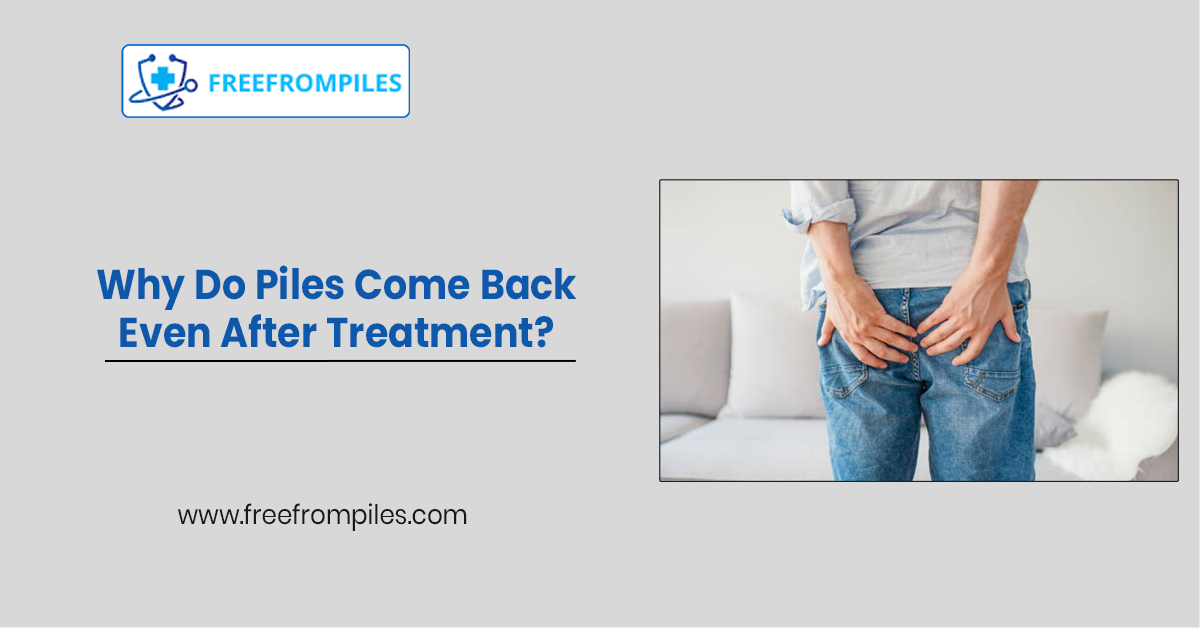Can Kidney Stones Come Back Afte...
- Dec 29, 2025

Relief feels amazing… until you get to panic again. It’s a feeling all too familiar to those who have had piles. You get treatment, you follow the rules closely, and for a while, life looks normal. Then, out of nowhere, more pain, itchiness, or bleeding. It leaves you exasperated and often bemused: why do piles come back even after treatment? To understand this, one needs to go not just beyond the procedure, but into lifestyle, habits, and conditions.
Piles, also known as hemorrhoids, are large and swollen veins that develop in the rectum and anus. They may be internal or external, and each has its own set of symptoms:
Although the treatments — including everything from medications to laser procedures — can get rid of piles, this doesn’t mean that piles are always a one-off problem. As Dr Madhav Mayank Sharma says a lot “Treating piles is like dousing fire in the forest, and if you do not remove the fuel, it will flare again”.
Here’s why piles can return after being treated:
Lifestyle: Extended hours of sitting or a lack of exercise can be a strain on the rectal veins.
Dietary Routine: A Diet that is low in fibre and water can lead to constipation, putting stress on the veins.
Chronic Bowel Issues: Chronic constipation or chronic diarrhoea leads to weakened anal tissue.
Obesity: Large amounts of abdominal fat push on the veins, increasing pressure and the likelihood of a return.
Pregnancy or Hormonal Changes: Women can still develop piles after being treated as a result of hormonal changes.
Overlooking Aftercare: If you don’t adhere to nutrition and lifestyle change advice, your chances of a recurrence may rise.
“Treatment itself doesn’t cure the problem,” Dr. Sharma says. “It’s all about your day-to-day habits if the issue will rear its head again.”
Recurrent piles after treatment can be demoralising, but it doesn’t mean failure of the treatment. Hemorrhoids are often a chronic condition, and recurrence after treatment is not uncommon, but it rarely denotes a need for surgery unless continued irritants can be addressed. Recognizing early signs is crucial:
Early detection allows control of symptoms as well as the prevention of further aggravation, while reducing inconvenience and avoiding complications.
Small changes in your routine behaviors can defend you from the recurrence of piles. Consider the following:
While lifestyle changes are important, professional attention is also important.
Dr. Madhav Mayank Sharma (M.B.B.S., D.N.B. Surgery, Fellow of Endourology) is one of the best Piles Specialists in Bharatpur, providing the most appropriate and advanced hemorrhoids proctology treatment with laser & minimally invasive surgery options. He educates patients about anal disorders and offers treatment options for them to treat piles recurrence in the form of a long-term cure with the least suffering.
Piles can recur, but knowing the factors and following preventive measures. It is manageable with healthy habits, a diet plan, and a doctor’s advice. With control, it can be done so that recurrence chances will be less.